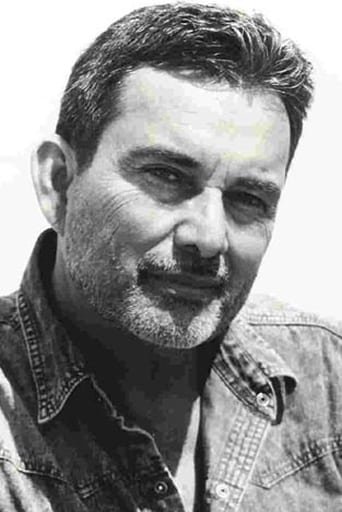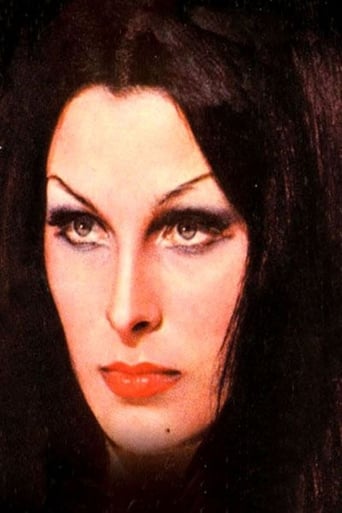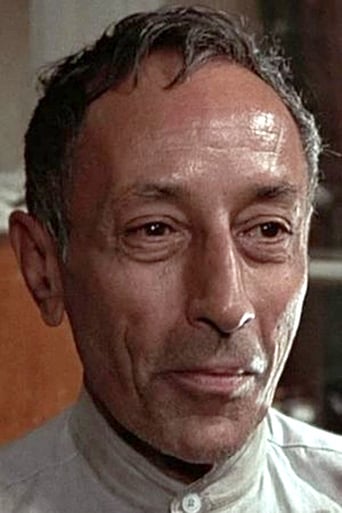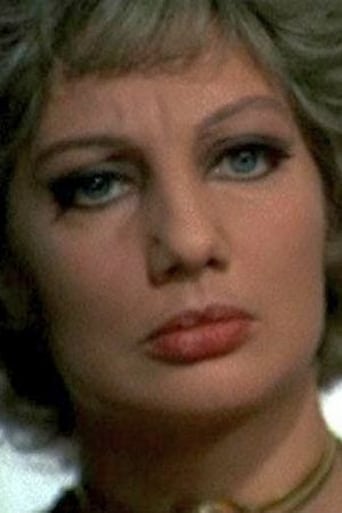ElMaruecan82
Whether for literature, theater or any art of storytelling, there can't be a plot without characters to drive it. Yet characters don't imply a specific plot and this might be the area where theater slightly surpasses literature, as an art of 'presence' and 'personalities' mirroring our condition. More than anything, it's a show, an invitation for eyes, for ears, for feelings. And emotions can do without plots.And here we have Fellini draining his talent from the Antic Roman-Greek tragicomedy, Commedia del' Arte, Opera and maybe more than anything, from his Italian roots so devoted to fun and entertainment. More than any other director, Fellini understood the virtue of Cinema as a new form of theater, a show that doesn't rely on plots or screen writing techniques, he shoots first and we ask the question later. And what a show! Fellini will forever be admired and never equaled, thanks to his unique talent to inhabit his films with unforgettable galleries of characters: eccentric, larger-than-life, decadent, greedy, gluttonous, sensual, ugly, outcast, colorful faces with anonymous names and universal and timeless appeals. These people feel real because they FEEL. And we're so hypnotized by the images that we forget to care about a plot.My repetition of the word 'plot' is only an anticipation of some rational comments on Fellini's "Roma" or, "Fellini's Roma", I must say. Yes, the film doesn't have a plot, even to those who set their minds for a surrealist tour orchestrated by the ultimate cinematic ringleader, Il Maestro Fellini. Even "8½" chronicled the very process of film-making from the author's boiling mind, even the previous "Fellini's Satyricon" was a take on a myth that had a story to tell, no matter how disjointed it felt. Even the nostalgic vignettes of "Amarcord" made a coherent ensemble, but "Fellini's Roma" has no focus whatsoever.But does it need one when the scope is so large, when Rome is the main protagonist? Rome... such a myth of a city that it transcends all the periods, visions and artistic possibilities. The film is constantly inhabited by Rome's aura from Fellini's perspective, hence the title. For "Satyricon", it was a legal necessity to distinguish from two films with the same title, to establish Fellini's independence from the original myth. "Roma" similarly establishes Fellini's independence, except that this time, no other vision of Rome could ever compete with Fellini's or approach the town with the same masterful audacity.Now, why a film about "Rome"? My guess is that it's one of the few privileged cities whose name evoke fascinating contradictions. "Rome is the city of illusions. Not only by chance you have here the church, the government, the cinema. They each produce illusions." This is Gore Vidal speaking in a memorable cameo and it's probably the closest rational conclusion that can come out of this mesmerizing mess. And "illusion" is the key word, whether it's the illusion of church that ignited the faith of generation of Italians without abjuring them from that lust for life and voluptuous bodies so rooted in the Italian lifestyle, for politics that have plunged post-War Italy into the darkness of fascism and yes, even Cinema doesn't escape criticism.Behind Fellini's eye, Rome oscillates between dazzling magnificence and nightmarish decadence. Fellini appears twice, as a young idealistic man who discovers the town, eats some spaghetti with the population, goes to the music-hall or visits a brothel, and the older real-life Fellini discussing with the new generation of Romans on how to make an accurate portrayal of the city. And it's ironic how nothing changed much between these times, "O Tempora! O Mores", yet Mussolini's Italy was as noisy, lusty and turbulent as in 1972, and ironically, "Roma"'s self-referential aspect illustrates the fact that both embellishment and derision rely on caricatures, the very illusions Fellini admits in his own filmmaking process.And illusion contributes to the film's most enigmatic moments: a parade of prostitutes tempting their clients, with sensual bodies to better hide the lucid tiredness in their faces, the scene followed by a sort of ecclesiastic fashion contest. Through the intriguing parallel, the iconoclast Maestro doesn't attack church but the myth of virtue that ignores the real sacred Trinity outside the Vatican border: life, love and lust. His fantasy vision works like a missing link between the eternal myth of Roma and reality. When thinking of Roma, we'll either have a vision of the Coliseum, of a fat Italian with huge bosoms serving a large plate of pasta on a summer evening, or maybe a beautiful red-haired and red-dressed woman sensually dancing at the moonlight of a lamppost, perhaps the greatest cinematic allegory of any town.And if the film works without characters, it does as well without a plot because Rome is that sensual woman with a history, a present, a future and a past. You can't dig a subway tunnel without bumping on archaeological relics hidden in its prolific womb, like a woman who hasn't revealed all her secrets. And one of the most poignant moments occurs when engineers find Antic frescoes in a tunnel, preserved just as if they were painted the day before, before oxygen destroys them instantly. That's the price you pay when you have a clear glimpse on reality, imagining how Romans were would have been more salutary for its (or her) own history. And this is the power of imagination, of illusion over reality or any myth of grandeur. No need for a plot when you have such a wonderful protagonist that encapsulates all the values Italians will forever stand for, and who more entitled than Fellini to share with us a part of his vision? And no need for specific characters when you have the Italians. A famous Italian actor, if I recall correctly, said something like "In Italy, there are about thirty millions actors, the rest of the population star in movies". This quote could have been the film's tag-line.
MartinHafer
This film consists of many different mini films within a film and all are tied together because they have something (no matter how tenuous) to do with Rome. Some are rather touching, some are very crude, some are meant to be very offensive but none of them were boring and all were accompanied by the usual cast of Felliniesque extras (ugly people, huge breasted whores and the like).If I had been in Fellini's shoes back in the early 1970s, I might have been tempted to do what he did with ROMA. Instead of a traditional narrative or plot, he just took disparate images and segments having to do with Rome and tossed it all together into a compote of sorts without a lot tie it all together. What could be easier? While a new or struggling director would have probably been ignored or castigated for such excess and lack of discipline, since it was the great Fellini, then it was the work of an artiste. In other words, since he'd attained great international fame by creating some wonderful films, now he was free to screw around and do anything he wanted and STILL pack theaters and make the critics happy! Talk about a great life! Now as for me, I have a habit of being a nay-sayer--someone who often tries to see things from a different point of view. And while I used to think Fellini was an overrated "genius", in recent years I have come to realize he was a great director as evidenced by LA STRADA and so many other great works. Unfortunately, because I also buck conventional wisdom, I also feel that starting in the 1960s, sometimes the director created some awful films that were adored by snobs but left the common man wondering if either the critics were nuts or they were. Frankly, after seeing SATYRICON, CASSANOVA and ROMA (all films that often carried Fellini's name on the title), I think I know the answer to that! If you like surrealistic and artsy films that make you feel smug in your own sense of self-importance, then by all means watch and enjoy this film. As for me, I just think all these films were really a form of self-parody and Fellini was just having a laugh at the expense of his die-hard fans. As for me, I think I'd rather have a migraine than see this film again--no matter how good some parts of the film were.FYI--A warning to parents. This film has quite a bit of nudity featuring very unattractive women's breasts. There is also a scene where a little kid pees in the aisle of a theater--something I didn't need to see. Additionally, there is a rather irreverent jab at the Church near the end, so parents should exercise some caution before letting their kids see this--but on the other hand, what kid would WANT to see this?!






